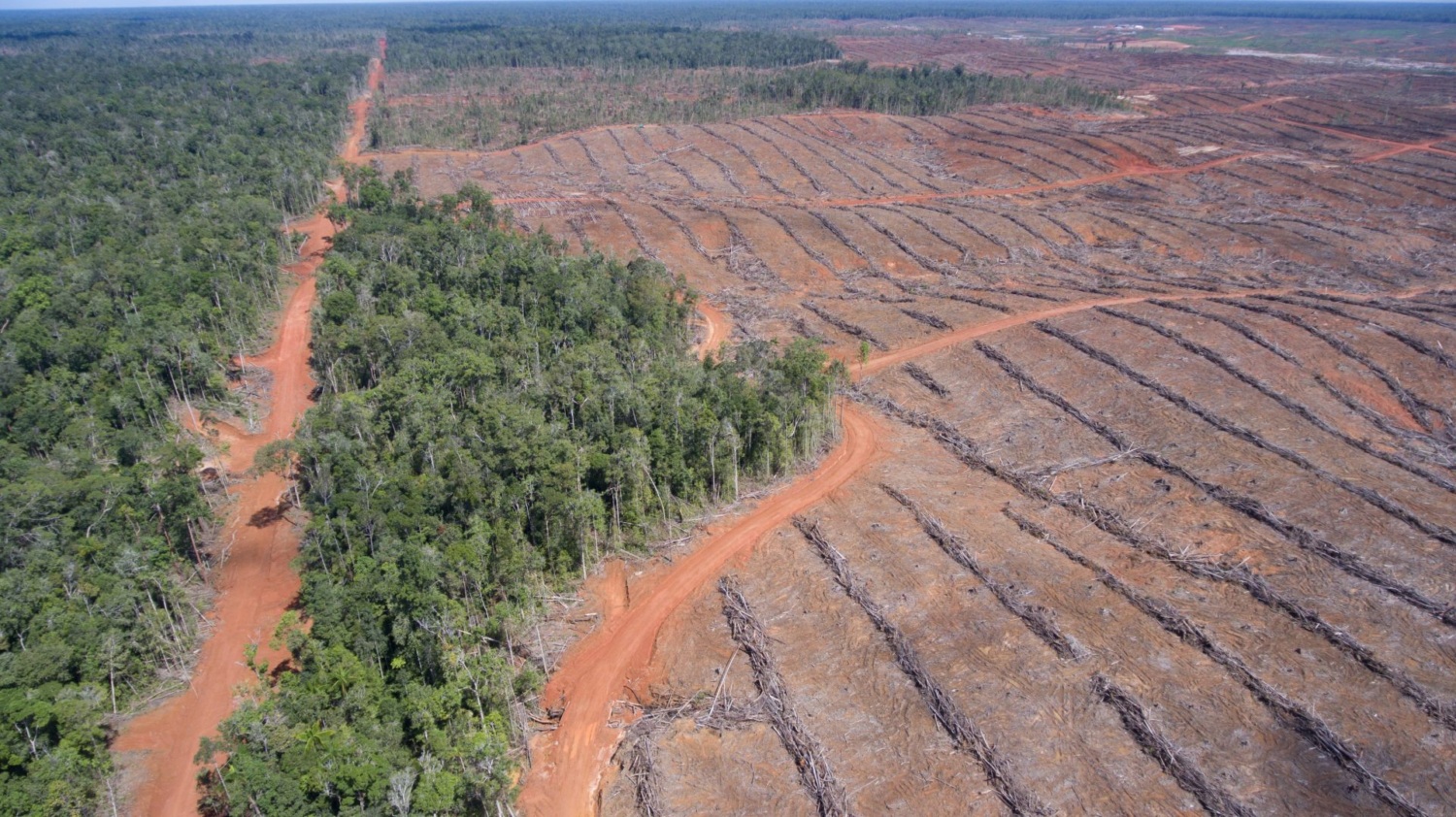
Papuan Community Leaders Call For Protection of Indigenous Rights; Also Hit Back at Korindo Group’s Manipulation of Stakeholder Meeting
On August 9th, leaders from Papuan indigenous communities hosted a press conference in Merauke in honor of the International Day of the World’s Indigenous Peoples and timed with the first Papuan Film Festival which focused on the theme of indigenous rights and environmental sustainability.
Their press release describes the situation faced by many indigenous communities in Papua whose lands have been permitted for monoculture commodity agriculture:
“Currently, permits for large scale commercial investment in the natural resource industries, including mining, plantations and logging, as well as infrastructure, have been issued across the majority of the lands and forests which make up the homelands of the indigenous peoples of Papua.
This subject is depicted in some of the films in the Papuan Film Festival currently taking place in Merauke. In Merauke and Boven Digoel Regencies, the government has issued permits for plantations and industrial timber estates covering a vast area.
Policy and investment activity is only based on private capital-intensive investment, technology and modern organisation, a model which has been seen in practice to disregard the rights of indigenous Papuans, limit or eliminate entirely indigenous people’s access to the land which provides their livelihoods, result in horizontal conflict or disharmony, violence and human rights violations, as well as widespread environmental destruction.”
Hitting Back at Korindo Group’s Manipulation
The press conference was also a community effort to set the record straight regarding a recent stakeholder meeting on palm oil development in Papua, held in Jakarta, with the local governments and the palm oil company Korindo Group, that the indigenous leaders felt was manipulated to appear as if their views were represented:
“The head of Nakias village, Mr Melkior Wayoken, suspected that manipulation had taken place to produce statements supporting the company, and that certain individuals had claimed to represent the indigenous community and village governments of Nakias, Tagaepe and Yalhak villages. According to Melkior, one individual was masquerading as the village head and signed a statement, and then used the village government stamp. ‘The statement was made without my knowledge, even though I am the village head, and then they joined the Bupatis of Merauke and Boven Digoel on their trip to the meeting in Jakarta. It was only afterwards that I heard they had signed a letter claiming to be the village government. I was shocked, and so I want to say that I, speaking to you now, am the real village head, and I clearly don’t accept this. If they knew I was here then why didn’t they call on me, as the leader of the village administration in the area the company is working? I’ve been elected by the people of Nakias village and they knew I was in Merauke, so why didn’t they ask me?’, Melkior explained.”
Calling For Action
Y.L. Franky, the Director of Yayasan Pusaka in Jakarta, spoke at the press conference about the underlying problems facing indigenous people in Papua. According to Franky, the serious problems indigenous people have to face include the loss of their rights and sovereignty, a lack of participation in development to determine its direction, the loss of a sense of security and the limits on the right to free expression, and the loss of autonomy to develop productive economic enterprises.
The leaders called for the following actions:
- Local government must oversee investment activities to make sure they are legal, and do not violate the rights of indigenous people or destroy the environment.
- Local governments should issue policy and develop programmes which respect the rights of indigenous Papuans and protect the land which provides their livelihood.
- Local government should carry out an audit of all plantation companies present in the area, review any permits or contracts which violate indigenous people’s basic rights or disadvantage indigenous people.
- We urge companies to respect the basic rights of indigenous Papuans, to avoid causing horizontal conflict within indigenous communities, not to use state security forces to protect their investment, to respect any community decisions not to surrender their lands and forests for business purposes, to protect important sites for the community and to provide adequate economic empowerment for the community and for company workers, without discrimination.
Here is an English translation of the full press release:
Press Release
Indigenous people from Nakias Tagaepe and Ihalik villages, Wambon Tekamerob Indigenous Community, SKP KAMe, Sawit Watch, Yayasan PUSAKA, Papuan Voices, Belantara Papua, SKPKC Fransiskan Papua, Garda Papua, Suara Papua, Tabloid Jubi, Yayasan Teratai Hati Papua (YHTP), Papuan Independent Students Forum, PMKRI Merauke Branch.
Hormati Hak Orang Asli Papua dan Lindungi Ruang Hidup Masyarakat Adat
Respect Indigenous Papuans’ Rights and Protect the Spaces which Provide Indigenous Livelihoods.
Today we are commemorating the International Day of the World’s Indigenous Peoples. This date was established by the United Nations General Assembly in 1994. The indigenous peoples’ struggle at the international level has already resulted in the UN General Assembly adopting the United Nations Declaration on the Rights of Indigenous Peoples on the 13th September 2007. This historic event for indigenous peoples deserves serious attention, a sign of respect for those who are still fighting for the rights of indigenous peoples.
Currently, permits for large scale commercial investment in the natural resource industries, including mining, plantations and logging, as well as infrastructure, have been issued across the majority of the lands and forests which make up the homelands of the indigenous peoples of Papua.
This subject is depicted in some of the films in the Papuan Film Festival currently taking place in Merauke. In Merauke and Boven Digoel Regencies, the government has issued permits for plantations and industrial timber estates covering a vast area.
Policy and investment activity is only based on private capital-intensive investment, technology and modern organisation, a model which has been seen in practice to disregard the rights of indigenous Papuans, limit or eliminate entirely indigenous people’s access to the land which provides their livelihoods, result in horizontal conflict or disharmony, violence and human rights violations, as well as widespread environmental destruction.
Recently a stakeholder meeting took place in Jakarta, attended by the governments of Merauke and Boven Digoel, the Korindo Group, and individuals who described themselves as representatives of indigenous communities in Merauke and Boven Digoel. A topic discussed in the meeting was that land could not be cleared for a community smallholding scheme, because NGOs had issued a moratorium.
The head of Nakias village, Mr Melkior Wayoken, suspected that manipulation had taken place to produce statements supporting the company, and that certain individuals had claimed to represent the indigenous community and village governments of Nakias, Tagaepe and Yalhak villages. According to Melkior, one individual was masquerading as the village head and signed a statement, and then used the village government stamp. “The statement was made without my knowledge, even though I am the village head, and then they joined the Bupatis of Merauke and Boven Digoel on their trip to the meeting in Jakarta. It was only afterwards that I heard they had signed a letter claiming to be the village government. I was shocked, and so I want to say that I, speaking to you now, am the real village head, and I clearly don’t accept this. If they knew I was here then why didn’t they call on me, as the leader of the village administration in the area the company is working? I’ve been elected by the people of Nakias village and they knew I was in Merauke, so why didn’t they ask me?”, Melkior explained.
Father Anselmus Amo, MSC, the director of SKP KAMe (the Justice and Peace Secretariat of Merauke Catholic Archdiocese), stated his opinion, that a moratorium is not issued by an NGO. This is a misleading statement, and it is irresponsible to make such claims. A moratorium places obligations on a company to abide by regulations issued by government. Recently the Indonesian Government’s moratorium on new permits in primary forests and peatlands was renewed, via a presidential directive. So what’s all this about NGOs placing a moratorium on a company, Amo underlined.
Father Amo also said that one of the NGOs’ complaints about the companies’ activities was that they had used fire to clear land. This accusation was brought because companies had clearly been burning land, which is forbidden by central government. It is a great shame if local government appears to be closing its eyes to this matter. Disregard from local government has already become systematic, meaning that even when the Bupati speaks about developments which would be positive for local people, it is not guaranteed whether his technical staff will follow them up. NGOs make accusations about companies because human rights violations and environmental destruction have taken place in their concessions. If companies cared about human rights and the environment, then there is no way that NGOs would make such complaints.
A similar point was made by Inda Fatinaware, Executive Director of Sawit Watch, who said that community should not be misled by talk of moratoriums. The moratorium issued by the government was to call a temporary halt to new permits in primary natural forest. There is no relation whatsoever to the issue of smallholder schemes. Companies have to provide smallholdings for local people, this is obligatory and clearly stated in the 2014 Plantation Law (UU39/2014). Therefore there is no reason why a company shouldn’t develop such a smallholder scheme. What’s more, a company such as Korindo, which has already been operating in Merauke and Boven Digoel for many years, should already have provided smallholdings for the community. The question should be what has the company been doing all this time, and why hasn’t it still not developed community smallholding schemes? Don’t use the moratorium as an excuse not to develop smallholding schemes.
Y.L. Franky, the Director of Yayasan Pusaka in Jakarta, wanted to take this opportunity to draw attention to the underlying problems facing indigenous people. According to Franky, the serious problems indigenous people have to face include the loss of their rights and sovereignty, a lack of participation in development to determine its direction, the loss of a sense of security and the limits on the right to free expression, and the loss of autonomy to develop productive economic enterprises based on the knowledge of local indigenous people.
This situation has occurred because the state has neglected to respect and protect indigenous Papuan’s rights, which makes it impossible to achieve a good standard of community welfare and to uphold the law, as laid down in the constitution and subsequent laws, such as the Special Autonomy Law (articles 42 and 43), Franky explained.
In consideration of this situation, we believe the following actions are necessary:
- Local government must oversee investment activities to make sure they are legal, and do not violate the rights of indigenous people or destroy the environment.
- Local governments should issue policy and develop programmes which respect the rights of indigenous Papuans and protect the land which provides their livelihood.
- Local government should carry out an audit of all plantation companies present in the area, review any permits or contracts which violate indigenous people’s basic rights or disadvantage indigenous people.
- We urge companies to respect the basic rights of indigenous Papuans, to avoid causing horizontal conflict within indigenous communities, not to use state security forces to protect their investment, to respect any community decisions not to surrender their lands and forests for business purposes, to protect important sites for the community and to provide adequate economic empowerment for the community and for company workers, without discrimination.
Contact Person
- Pastor Anselmus Amo MSC, SKP KAMe Director (081287778974)
- Mario, Sawit Watch (085228066649)
- Y.L. Franky, Yayasan Pusaka (081317286019)


